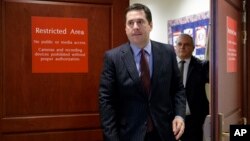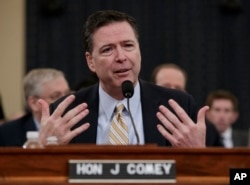The House of Representatives Intelligence Committee met behind closed doors Thursday, a day after its investigation into wiretapping allegations involving President Donald Trump and his predecessor, former President Barack Obama, was thrown into disarray.
Republican Congressman Devin Nunes, chairman of the panel, defended his disclosure Wednesday that legal, wiretapped conversations of foreign agents talking with Trump officials after the November election, but before he took office in late January led to the "incidental collection" of comments made by the Trump aides, and possibly Trump himself.
Nunes spoke with reporters and the president about the material without informing any of the other 21 members of the committee.
Before heading into the panel's meeting, Nunes said his disclosures and a subsequent briefing he gave Trump at the White House were "a judgment call." He said of his meeting with Trump, "I called down there and invited myself."
White House Press Secretary Sean Spicer on Thursday defended the committee chair coming to brief the president without first sharing information with other members of the committee a move that has infuriated opposition Democrats.
Nunes wanted to make it "very clear" that what was heard on intercepted communications by the U.S. government "had nothing to do with Russia," and "he had an obligation to make sure the president knew what he had discovered," said Spicer.
After the hearing, one Democrat on the panel, Congresswoman Jackie Speier, said Nunes apologized for his unilateral disclosure of the information.
Before the meeting, Nunes deflected a question about whether the White House had orchestrated the release of the documents to undercut the testimony before the committee earlier this week by Federal Bureau of Investigation Director James Comey.
Comey refuted Trump's wiretap claims
In his remarks, Comey testified that there is no information to support Trump's March 4 Twitter allegations that Obama wiretapped his Trump Tower headquarters in the weeks before the election.
Nunes declined to say who gave him the documents, saying, "We are not going to ever reveal sources."
After meeting with Trump, Nunes, a political supporter of the president's during his long run to the White House, told reporters, "What I’ve read seems to me to be some level of surveillance activity - perhaps legal, but I don’t know that it’s right. I don’t know that the American people would be comfortable with what I’ve read.”
Trump said he felt somewhat validated about his wiretapping allegations, even though Nunes' disclosure did not mirror Trump's claims in his string of Twitter comments earlier this month.
Lawmakers criticize Nunes' action
The top Democrat on the House Intelligence panel, Congressman Adam Schiff, said Nunes' action of disclosing the material and then briefing Trump, his political ally, “casts quite a profound cloud over [the committee's] ability to do the work,” and he called for the formation of an independent commission.
“If the chairman is going to continue to go to the White House rather than his own committee, there’s no way we can conduct this investigation,” Schiff said.
WATCH: Schiff on need for independent commission
Senator John McCain, a veteran lawmaker who was the losing 2008 Republican presidential candidate, called Nunes’ actions Wednesday “remarkable” and “bizarre.” McCain called for a special committee to look into the various wiretapping allegations and whether Trump aides colluded with Russian officials to help Trump win.
"It's a bizarre situation," McCain said of the House Intelligence panel's actions. "I think that this back and forth and what the American people have found so far is that no longer does Congress have the credibility to handle this alone."
Comey said the FBI is investigating whether Trump officials criminally colluded with Russian operatives during the election campaign to help Trump win. The Senate Intelligence Committee is also probing the U.S. intelligence community's conclusion that Russia meddled in the election to support Trump.







